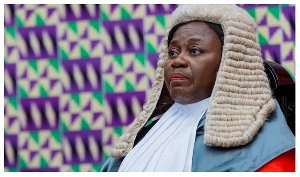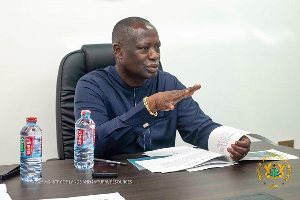Ghana is considered one of the more stable nations in West Africa, having transitioned to multi-party democracy in 1992. However, corruption, often referred to as "ketease hye ne proye" (meaning hide it under the bed and let it rot), is prevalent in all sectors of Ghanaian society.
Many concerned citizens have proposed asset and liability declarations to combat this issue. These declarations would require public officials to disclose details about their personal wealth, including property and investments.
This initiative tackles corruption by pinpointing possible conflicts of interest and unexpected wealth increases. By mandating asset declarations from officials before they take on public roles, we pave the way for greater transparency. This openness discourages corrupt activities like bribery and embezzlement and fosters a culture of integrity and trust.
Unfortunately, Some Ghanaians oppose asset disclosure because they believe that requiring officeholders to reveal their financial conditions and property holdings infringes on their fundamental human rights. They argue that making public the assets of officials could invade their privacy and expose them to unwanted pressures, especially considering the potential misuse of social media and other information-sharing platforms.
Public officials with known assets may also face pressure from their communities and families, as they may be criticized for not providing personal financial assistance when needed. This pressure can, in turn, increase the risk of corruption among these officials.
Additionally, public wealth statements might make officials more appealing targets for criminals. With the crime rate in Ghana currently high, particularly regarding armed robbery, officials may feel anxious if someone tracked their financial accounts using a smartphone.
Ghanaians should support public officials in reporting their assets for several reasons, especially regarding the identification of conflicts of interest. Asset declarations can expose potential conflicts where a public official's personal financial interests may affect their decision-making.
Moreover, when public officeholders disclose their assets before assuming office, it enables the public to monitor any changes in their wealth and raises concerns if there are unexplained discrepancies. This practice ultimately leads to greater accountability among public officials.
The practice can foster a culture of integrity and ethical behaviour within the government, enhancing public trust.
Asset declarations can also provide crucial information for investigating corruption allegations and support potential prosecutions if any irregularities are found.
The advantages of asset disclosure in Ghana's fight against corruption are significant, but implementation challenges exist. One major difficulty is the process of managing these declarations. Simply filing asset declarations is not enough; there needs to be an oversight body to ensure that each form is complete and accurate. Such reviews can help identify mistakes or omissions, enhance the system's integrity and credibility, and highlight disclosures by officials that may require further examination.
Additionally, the resources needed to operate this system can be burdensome. A well-resourced, fully staffed oversight agency is essential for the system to function effectively. This agency must possess adequate investigative capabilities to fulfil its mission; without these resources, the system will struggle to operate efficiently.
Political support is a significant obstacle to the effective implementation of asset declaration in Ghana. Few politically exposed individuals are willing to make their wealth and interests public. This reluctance may manifest in passive non-compliance or more aggressive tactics, such as attempting to limit the authority of the relevant agency. However, this resistance should not deter the government from pursuing this essential method of combating corruption in the country.
Asset disclosure must encompass all public officials susceptible to corruption to be effective. This includes high-ranking officials such as ministers, deputy ministers, heads of agencies, lawmakers, judges at all court levels, and any public employee with decision-making authority. It should also cover national and subnational authorities controlling public funding or legislative decisions.
Additionally, it should include individuals closely connected to Politically Exposed Persons (PEPs), such as spouses, domestic partners, children, and close colleagues. Another crucial factor for the success of this system is that the information required to identify unlawful enrichment of public officeholders must include all significant financial flows.
This should encompass income, loans, gifts, movable assets like cars, and immovable assets such as homes and land. Individuals must declare their assets when they initially assume an official role. These asset declarations should be updated regularly, at least once a year, to reflect any changes in their financial situation.
To maintain the integrity of this initiative, there should be mandatory reporting even after individuals leave public service to identify any delayed enrichment.
Sanctions must be enforced against those who fail to comply, and serious mistakes or omissions should warrant criminal prosecution. Sanctions must be rigorously enforced against individuals or entities that fail to comply with regulations. Serious errors or omissions should result in criminal prosecution.
Moreover, it is essential to establish a robust oversight agency tasked with ensuring the integrity of submitted declarations through thorough cross-checking of data and comprehensive physical verifications.
This proactive approach will reinforce accountability and uphold the highest standards of compliance.
Legislation must also establish an oversight agency to verify the accuracy of the information in declarations, including cross-checking data and conducting physical verifications. While discussing such a sensitive issue may invite backlash, Ghanaians must understand that an effective asset disclosure system ensures accountability and integrity among officeholders, as practised in many developed countries. Implementing such a system in our nation could uncover illegitimate enrichment and prevent conflicts of interest.
Lack of political support, as well as privacy and security concerns, hinder the effective implementation of asset declaration in Ghana. These issues also impede the country's efforts to utilize asset declaration as a tool to combat corruption. However, this resistance should not deter the government from pursuing this essential method of combating corruption in the country.
Asset disclosure must encompass all public officials susceptible to corruption to be effective. This includes high-ranking officials such as ministers, deputy ministers, heads of agencies, lawmakers, judges at all court levels, and any public employee with decision-making authority. It should also cover national and subnational authorities controlling public funding or legislative decisions.
Additionally, it should include individuals closely connected to Politically Exposed Persons (PEPs), such as spouses, domestic partners, children, and close colleagues. Another crucial factor for the success of this system is that the information required to identify unlawful enrichment of public officeholders must include all significant financial flows.
This should encompass income, loans, gifts, movable assets like cars, and immovable assets such as homes and land. Individuals must declare their assets when they initially assume an official role.
These asset declarations should be updated regularly, at least once a year, to reflect any changes in their financial situation. To maintain the integrity of this initiative, there should be mandatory reporting even after individuals leave public service to identify any delayed enrichment.
Sanctions must be enforced against those who fail to comply, and serious mistakes or omissions should warrant criminal prosecution.
Furthermore, legislation should establish an oversight agency to verify the accuracy of the information in declarations, including cross-checking data and conducting physical verifications.
While discussing such a sensitive issue may invite backlash, Ghanaians must understand that an effective asset disclosure system ensures accountability and integrity among officeholders, as practised in many modern countries.
Implementing such a system in our nation could uncover illegitimate enrichment and prevent conflicts of interest. In conclusion, I urge Ghanaians to recognize that asset declaration for public officials is critical. It promotes transparency, enables public scrutiny of their wealth, and helps identify potential conflicts of interest or illicit enrichment. Ultimately, it holds public officials accountable for their financial activities and fosters public trust in government institutions.
In conclusion, I urge Ghanaians to recognize that asset declaration for public officials is critical. It promotes transparency, enables public scrutiny of their wealth, and helps identify potential conflicts of interest or illicit enrichment. Ultimately, it holds public officials accountable for their financial activities and fosters public trust in government institutions.
Opinions of Monday, 3 March 2025
Columnist: Kwame Aduhene-Kwarteng (PhD)





![Declan Rice shouting at Partey [L] Declan Rice shouting at Partey [L]](https://cdn.ghanaweb.com/imagelib/pics/372/37287055.295.jpg)









